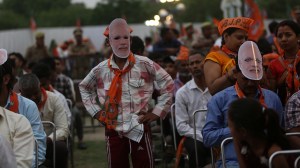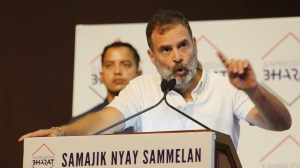- India
- International
MNS draws a blank in Mumbai, stares at dead end
Raj Thackeray’s party loses all its six seats in city.
Raj Thackeray’s Maharashtra Navnirman Sena (MNS), which was the game-changer in the 2009 Assembly elections when it ended up helping the Congress-NCP combine by denting the Sena-BJP votes with its impressive performance, has drawn a blank this time in Mumbai, where it held six seats.
This time, the party has won just one seat, Junnar in Pune district.
In 2009, the party had won 13 Assembly seats in the state. Most of these were in urban areas – six in Mumbai, two in Thane, three in Nashik, one in Pune and one in Aurangabad. The MNS also finished second in more than 24 constituencies.
The seats in Mumbai that MNS won in 2009 were Vikhroli, Ghatkopar West, Bhandup, Magathane, Mahim and Shivadi, all of them Shiv Sena bastions. Of these, only Ram Kadam has retained his Ghatkopar West seat, that too on a BJP ticket.
Raj Thackeray, who broke away from the Shiv Sena in 2006, now finds himself with little left in terms of political clout. The Marathi manoos, it appears, has voted in favour of the original Sena, which has won 14 seats in Mumbai this time.

“It was said Uddhav’s main opposition was the MNS. This obviously confused Marathi voters in 2009 and divided votes, which in turn helped the Congress-NCP alliance,” said the Shiv Sena’s Prakash Surve, who has won from Magathane in the western suburbs, defeating sitting MNS legislator Pravin Darekar. “People can be misguided once, but not always. They have chosen the Shiv Sena again.”
A senior Shiv Sena leader said MNS strategists had shortlisted constituencies where they could gain from the worsening Shiv Sena-BJP spat, but the plan backfired.
One of these constituencies was Colaba where the BJP’s Raj Purohit was locked in a keen contest with the Shiv Sena’s Pandurang Sakpal. The split in the Sena-BJP votes was expected to help MNS candidate Arvind Gawade in the seat where anti-incumbency against sitting MLA Annie Shekhar was high. But Raj Purohit won with 52,608 votes, Annie Shekhar finished third with 20,410 votes while Gawade managed to get just 5,453 votes.
Taking a lesson from the 2009 elections, the Shiv Sena had this time appealed to voters before the alliance broke up this year. “Don’t vote for MNS. If you vote for MNS, it will mean voting for the Congress,” the Sena had urged.
In constituencies such as Borivali, Mulund, Chandivali, Chembur, Kalina and Byculla, where the MNS had finished second in 2009, pushing Sena to number 3, the trend changed this election. The MNS has been pushed to third, fourth and even fifth position in these assembly constituencies. While Borivali and Mulund seats were claimed by BJP, Chembur and Kalina were won by the Shiv Sena. Byculla was won by All India Majlis- E-Ittehadul Muslimeen (AIMIM) and Chandivali was retained by the Congress.
Another factor against the MNS could have been the large, strategic voting by communities opposed to it. “In a cosmopolitan city like Mumbai, the way each of its diverse communities voted played a vital role. Mumbai has a sizable Gujarati population and Maharashtrain Brahmins who are traditionally BJP voters. The Modi factor also had a major impact,” said North Mumbai BJP president J P Mishra.
The largest number of migrants in the city come from Uttar Pradesh and Bihar and they have traditionally voted against the Shiv Sena and MNS, which have targeted north Indians. While Sena managed to retain its seats and claim back those it had lost in 2009, all the above factors triggered the ouster of MNS from the city.
Apr 24: Latest News
- 01
- 02
- 03
- 04
- 05







































